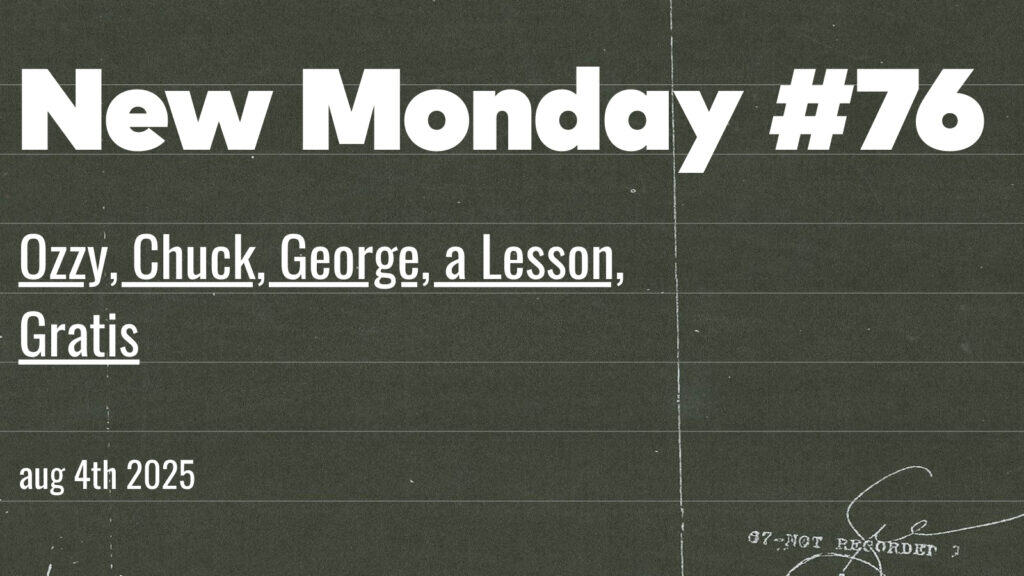New Monday #76
Happy Monday -
A mixed bag, my friends.
Ozzy
Listen to this - it works for this section really well.
There’s nothing I can meaningfully add to all that’s out there about Ozzy Osbourne. He was a unique talent, with an absolutely distinctive voice (have you ever heard another singer sound like Ozzy?) and a knack for melody. He combined that with a natural charisma, and somehow managed to make art and a life from a difficult childhood—he attempted suicide in his teens. The guy was probably saved by his father, who let his son spend a few months in jail and then bought him a PA system so he could sing for a band. The band eventually became Black Sabbath.
Through a career that went from clubs to stadiums to reality television, along with utter mayhem, tragedy and copious amounts of drugs, Ozzy remained authentic and simply a decent man—terribly flawed and out of his mind for sure, but never out of his heart.
Michael Beinhorn, who produced Ozzy’s 1995 album “Ozzmosis,” wrote an interesting memory from a different angle.
My Little Man - what a gorgeous song. Ozzy didn’t always write his own lyrics, but this co-write (with Steve Vai) is such a personal statement, clearly meant for his son, Louis.
Ozzy was really a softy. He died 17 days after his final concert, a charity event featuring a reunion of Black Sabbath’s original line-up in Birmingham, the band’s hometown. It raised millions of pounds for children’s hospitals in that same hometown.
Don't you know I love you more than life itself,
Don't you know that you're my pride
And I would not have you walking through this world
Without me by your side
Go to sleep my little man
Don't you weep my little man
Chuck
Listen to this - I cued it to the middle. It’s not Feels So Good, or Chase the Clouds Away, or Give It All You Got, or Bellavia, or The Children of Sanchez. The guy wrote a ton of music. And he was a spectacular player.
Chuck Mangione also owed his father. His dad would take Chuck and his brother, Gaspare, to jazz clubs in Rochester NY, and introduce them, out of hand, to cats like Dizzy Gillespie, and Miles Davis, and Sarah Vaughan. The Mangione boys would eventually start sitting in.
Connections are great, but Chuck was a monster talent. By the mid-60s he was playing with Art Blakey, and he was composing. He wrote songs that dominated the airwaves—Feels So Good in 1978 was as inescapable as Hotel California was in 1977. He’s credited with inventing “Smooth Jazz,” won Grammys (two) and was animated into a recurring character on King of the Hill. Like Mr. Osbourne, Mr. Mangione remained a hometown boy, teaching at the Eastman School of Music and performing for children on the weekends as “The Cat in the Hat.” He died in Rochester.
George
A thing to hear—you won’t be expecting this unless you’re a Golden Earring fan.
I would love to write a ton on George Kooymans but there isn’t a lot out there about him in English. He was the guitarist and main songwriter of the Dutch rock group Golden Earring.
Kooymans started playing with the band that morphed into Golden Earring in 1961. For the duration of his life, that was his main musical outlet. His last live performance was with them in January 2025. He couldn’t play—the ALS that would eventually kill him had already taken his hands.
I’m going out on a limb here: Kooymans is easily one of the best guitarists of the 1970s, and it’s not until Eddie Van Halen comes along that we see a rock player approaching Kooymans's chops and harmonic invention. He has a totally distinctive feel, with bends that sound like weeping, and a fusion player's fluidity and speed.
We know Golden Earring as a sort of blues-based kind of thing. Of course, Radar Love is the best driving song ever written. It’s been covered countless times, has been used in movies (in those car chase scenes), there’s a whole book about it, written in Dutch, and I found a website for it, dedicated to the timeline of the song’s existence. Now, George plays tasty blues licks over the world’s best four-note basseline, but if you dig into the albums, Golden Earring are more a strange prog rock band that liked to boogie: Flutes. Strings. Synths. Female backup singers. Shuffle grooves.
Golden Earring’s breakthrough record was "Moontan", but the follow-up, Switch, is even more interesting. The classic lineup of the band was easily as accomplished a bunch of players as the classic lineup of Deep Purple, not as heavy, but far funkier. Again, think prog boogie band.
So, my evidence of George Kooymans as guitar god... Off "Switch", here’s the title track, cued up to an extended solo that goes on for about two minutes. Intervallic stuff, melodic stuff, a Univibe, a wha-wha pedal... Again, who is playing like this in 1975? Peter Frampton? Terry Kath? Uli Roth? Jan Akkerman? Allan Holdsworth?
Last clip to drive home my point about Mr. Kooymans: Twilight Zone was an MTV staple in 1982, but unless you actually listened to the ride-out solo on the radio, you didn’t hear this killer moment.
Good lord! What an amazing player!
Lesson
Since this has been guitar-oriented, I wrote up a bunch of things on recording guitars. Some of you wrote in and asked as well. I carried some of the ideas on saturation forward into it. Find it here.
Free Stuff
Not from us, from producer/songwriter/unlikely star Moby.
Have you heard of mobygratis.com? It’s a website with 500 clips of Moby music you can use for free in your creative projects. Use them any way you wish. Build songs from them, use them in videos, Moby he don’t care. All free. A lot are very cool.

